Pakistan, polo and Shandur

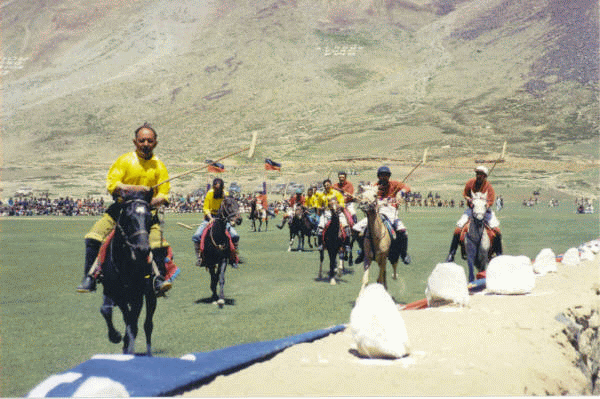 |
POLO
Describing the importance the game of polo, the WW-II acclaimed British
Prime Minister Winston Churchill once said that "A polo handicap is your
passport to the world". His words could not ring with more shattering truth
than in Northern Pakistan where Polo is truly the national sport, favoured
even over cricket and one in which people of all classes participate. The
government support the high cost of polo tournaments, making it one of
the few activities in Pakistani which is truly open to all. The approach
by jeep from Chitral takes a good nine hours. From Gilgit, east of the
Pass, the journey may take probably thirteen hours. With few exceptions,
the journey leads through the paradise-like green and cultivated highlands.
But one is constantly aware, on the dusty and rocky drive, that the wheels
of the jeep can be two inches away from an abyss - from 'hell'. This nerve-wracking
journey along narrow, stony paths from which even the vertigo-free mountain
goats retreat, will worsen when suddenly another jeep appears from the
opposite direction. Both drivers risk dangerous manoeuvres in an attempt
to pass each other. |
|
In fact in Pakistan, polo and Shandur are synonymous to each
other. While one witnesses polo teams, specially from Pakistan Army, playing
in Race Course Ground of Rawalpindi, a far tougher match is played at Shandur
(3,700 meters above sea level), between teams of Gilgit and Chitral. The
first time a polo tournament took place at the Shandur Pass, was in 1936.
Major Cobb, the British Political Agent of then Northern Areas used to
play polo at night when it was a full moon, since he thought that moon
looked so near the earth that a match in a moonlit night would change the
very meaning of the game. Because of this the Shandur polo ground came
to be referred to as the "Moony Polo Ground".
|
|
Besides polo, trout fishing at the nearby streams and lakes
and a festival of folk dances and music of the Northern Pakistan has added
extra attractions for tourists from all over the world. The site is described
dramatically as being on the ridge between Heaven and the descent to Hell,
since once the Shandur Pass was regarded as being 'half-way to Heaven',
although long gone are the days in which this could refer to Heaven, as
in the sense of gods caring for polo, or Hell as in the conquered soldiers
who had to march through it.
|
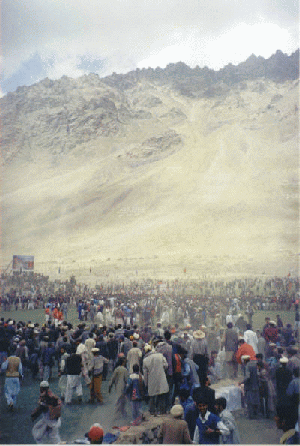 The
polo ground in the Shandur Pass is smaller in width and breadth than the
conventional field, being 60 yards wide and 220 yards long. Also alien
to a modern western player would be the 2 feet high stone wall which surrounds
the ground. In ice hockey, such a wall could prove advantageous - in polo,
it could lead to serious injuries in the event of a fall. The rules recall
ancient legends - for instance, how, after a successful goal the scorer
can dictate the continuity of a game. He picks up the ball and carries
it back at full gallop in his lap to the centre line, from where he will
throw it into the air and try to hit it and score a goal at the opposite
end of the field. As in contemporary polo, ends change side after a goal
is scored. The game is fast - tremendously fast. The Pakistani-bred Punjabi
and Afghan Badakshani ponies, both the result of breeding from Himalayan
mountain ponies and English thoroughbreds, are ridden in a wild style,
with a lot of skill and at full speed through the mêlée. A
total of twelve players are not afraid to use their sticks to hit not only
the ball but also, and vehemently, the arms and shoulders of their opponents. The
polo ground in the Shandur Pass is smaller in width and breadth than the
conventional field, being 60 yards wide and 220 yards long. Also alien
to a modern western player would be the 2 feet high stone wall which surrounds
the ground. In ice hockey, such a wall could prove advantageous - in polo,
it could lead to serious injuries in the event of a fall. The rules recall
ancient legends - for instance, how, after a successful goal the scorer
can dictate the continuity of a game. He picks up the ball and carries
it back at full gallop in his lap to the centre line, from where he will
throw it into the air and try to hit it and score a goal at the opposite
end of the field. As in contemporary polo, ends change side after a goal
is scored. The game is fast - tremendously fast. The Pakistani-bred Punjabi
and Afghan Badakshani ponies, both the result of breeding from Himalayan
mountain ponies and English thoroughbreds, are ridden in a wild style,
with a lot of skill and at full speed through the mêlée. A
total of twelve players are not afraid to use their sticks to hit not only
the ball but also, and vehemently, the arms and shoulders of their opponents.
|
| There is an interesting legend attached to polo in northern Pakistan,
dating perhaps from the days before history was recorded. It appears that
a king begged the gods to give him back his missing wife. The gods, in
return, made it a condition that the king must sacrifice his two sons.
They gave him a fast horse - it 'brought mountains together and split the
valleys' in the tale - and sent him to a lost valley in Baltistan, some
two hundred miles from Shandur. There, so the story continues, he arrived
with the heads of his sons, and had the task of hitting them both, at fast
gallop, with his polo stick into an opening in the mountains. If he succeeded,
he would regain his missing queen. Most extraordinary is that, to this
day, beyond a very small opening in a mountain in Baltistan, near Kaphulu,
is a real polo field which is identical to that in the legend. |
| Besides polo, Shandur Festivities have much to offer to the tourists,
who start arriving almost a week before the three-day festivities that
from July 7-9 each year. Everybody prefers to camp near the polo ground,
a piece of land natural in its topographical character. |
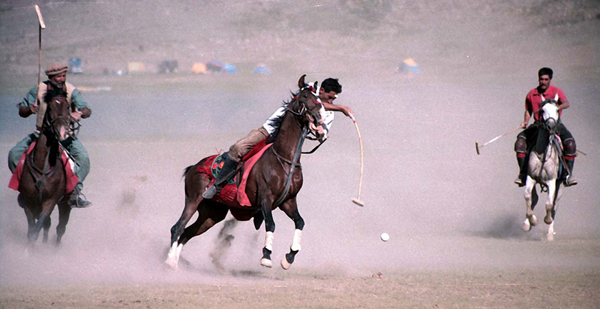 |
Nights are usually spent playing cards and dancing on local tunes.
Music competitions are also held between groups from Chitral and Gilgit.
During day the tourists go to nearby Phandar Valley for freshwater fishing.
Besides horse ridden polo, there is donkey polo which offers fun of its
own kind. Unlike the fast moving horses, donkeys move slowly but surely
towards the goal posts. Tug of war, tribal march past, folk dances and
paragliding by locals and foreigners add further zest to the occasion.
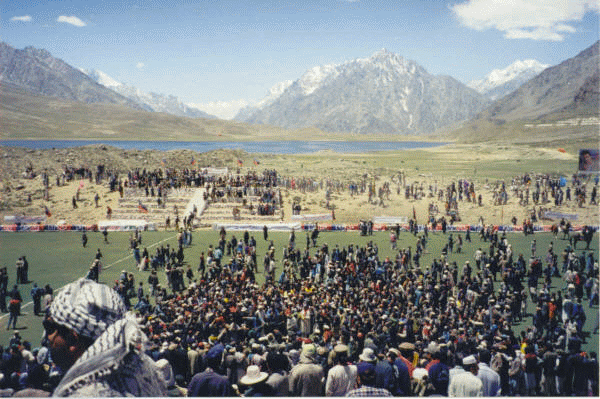 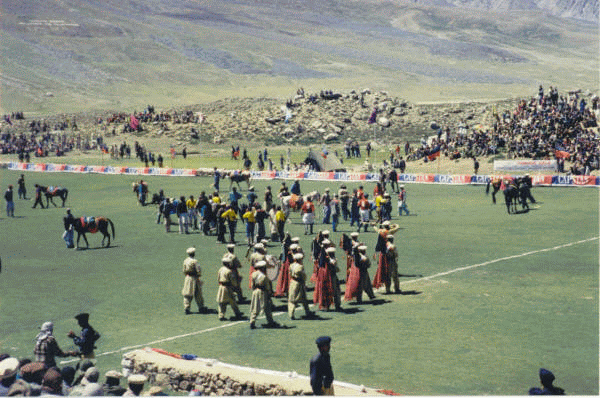 |
Thiss article courtesy
External link: http://www.pakistanpaedia.com/oth_sports/shandur/shandur_polo_festival.html |
|
|
Want to Travel to Pakistan?
See this article |
|
Other places worth visiting Pakistan
Rhotas Fort |
|
|
|
|
|
|
|
|
|
|
 |
 Homeother
catergorie
Homeother
catergorie
 Homeother
catergorie
Homeother
catergorie